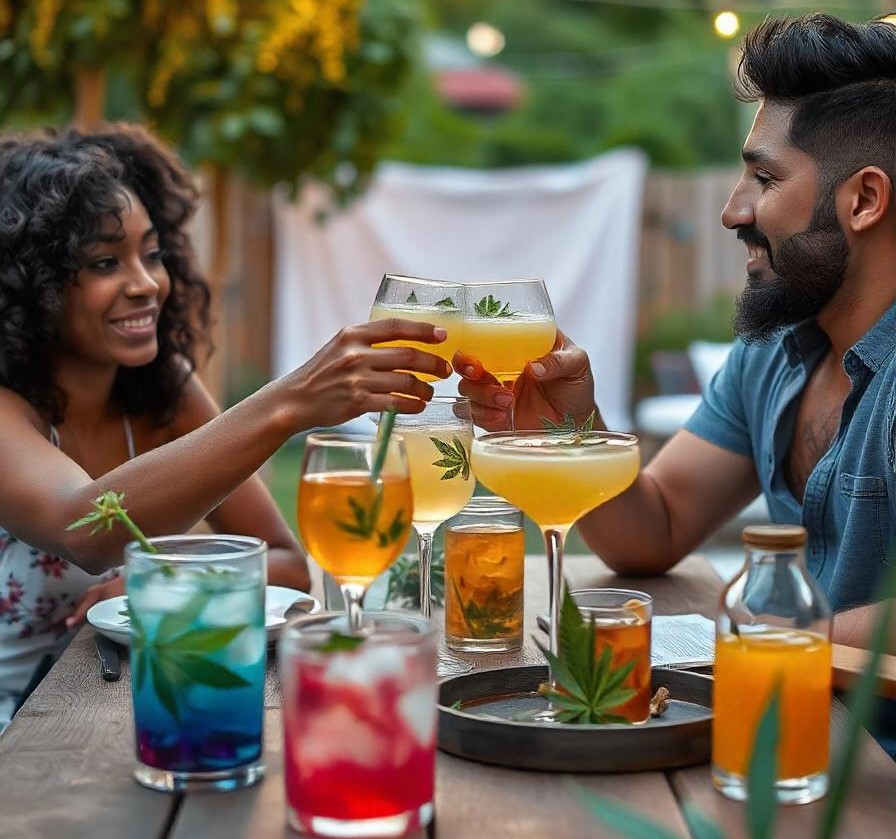Alcohol and Marijuana: Combined Effects and Risks
Mixing cannabis and alcohol can cause unpredictable and sometimes dangerous effects. Both substances affect the body and brain differently, and mixing them can intensify the effects. This can result in increased impairment, higher risk for health, and potentially unpredictable emotional reactions. The term “cross-fading” describes the intensified feeling users experience when consuming both substances together.
Knowing how marijuana and alcohol affect your body differently and the dangers of mixing them can assist users in making better decisions. If you decide to mix them together, adhering to security guidelines is vital to avoid injury.
How Alcohol and Marijuana Affect the Body Separately
While alcohol mostly plays with our nervous system, affecting the brain’s activity, marijuana changes our mood and motor abilities.
Alcohol
Alcohol can affect the central nerves of the nervous system through a slowing of the brain’s activity. It involves coordination, slows judgment, and decreases the speed at which one reacts. If blood alcohol levels rise, the person’s ability to think clearly diminishes. This could increase the likelihood of accidents, and reckless behavior and increase the chance of health problems that are chronic, such as dependence and alcohol-related liver diseases.
Regular alcohol consumption can result in physical dependence. In time, it increases the risk of developing mental health problems like depression and anxiety. Combining alcohol and cannabis can intensify these effects and can lead to more serious impairment. When mixing cannabis and alcohol, it speeds up THC absorption, further affecting the brain’s function and enhancing levels of intoxication.
Marijuana
Marijuana is a stimulant to the endocannabinoid process, affecting mental state, mood as well as motor abilities. The primary psychoactive component, THC, binds to the brain’s receptors, which causes feelings of euphoria or a sense of relaxation. However, excessive THC concentrations can cause anxiety, paranoia, or even hallucinations when users are not experienced.
In contrast to alcohol, marijuana impacts quick-term memory as well as coordination but does not directly affect the central nervous system. In the long run, marijuana use can cause dependence and even worsen the existing mental health problems. When mixing cannabis and alcohol, cannabis can cause the effects of alcohol, making users feel more drunk for longer durations. The combination increases the dangers of nausea and disorientation.
Combined Effects of Alcohol and Marijuana
When cannabis and alcohol are combined, the effects of both substances get intensified. This is referred to as “cross-fading”, where the combination of alcohol and marijuana causes a feeling of an increased level of intoxication. Alcohol may increase levels of THC and cause stronger or longer-lasting effects. The result is that users feel more disoriented, slow, or even more mentally impaired in comparison to when they use either on its own.
Cross-fading can increase the likelihood of adverse reactions, such as nausea, dizziness, and impairment in motor skills. Increased THC concentrations in cannabis, together with higher levels of blood alcohol, may intensify these symptoms. Additionally, cross-fading can affect the ability to determine the level of impairment and increase the chance that you drink alcohol, causing severe impairment. The unpredictability of this process often leads to impaired individuals not knowing what they’re feeling, which could result in injury while doing things like driving.
Since the interactions between these substances vary depending on the individual, Users can experience anything from a mild feeling of happiness to intense discomfort. The unpredictability makes it crucial to approach cross-fading with caution.

Risks of Combining Alcohol and Marijuana
Mixing cannabis and alcohol can result in severe health hazards that go beyond the possibility of temporary impairment. The mix affects the body and mind, increasing the likelihood of severe reactions. Here are the main risk factors associated with cross-fading.
Increased Impairment
Combining the two causes a greater impairment that affects the ability to move, judgment, and overall cognitive performance. This makes driving or operating machinery extremely risky. Cross-fading may also result in overestimating a person’s capabilities, leading to risky behavior.
Here are some of the major effects of impaired performance:
- Slower reaction time: Alcohol decreases alertness and marijuana reduces coordination. It makes it harder to react quickly.
- Poor coordination and reduced focus: The two substances can affect motor skills, increasing the chance of falling or injuries.
- Higher risk of injuries and accidents: Cross-fading is often the cause of accidents because of inexperienced judgment and slow reaction times.
Greater Risk of Nausea and Vomiting
Combining both substances can cause nausea or vomiting. Alcohol causes digestive discomfort and marijuana can cause the feeling of disorientation and dizziness, especially at higher THC levels. Combining these two substances impedes the body’s ability to process substances, causing discomfort.
The combination can lead to:
- Stomach irritation from alcohol: The alcohol inflames the stomach lining, which makes people more susceptible to nausea.
- Amplified dizziness from marijuana: Marijuana alters the balance and when mixed in conjunction with alcohol, the dizziness can become worse.
- Severe vomiting in extreme cases: Cross-fading may cause vomiting that is excessive, leading to dehydration.
Psychological Effects
Combining cannabis and alcohol can cause severe psychological reactions, particularly for those susceptible to mood disorders. Although alcohol can initially cause feelings of relaxation, its effects of depression can lead to feelings of anxiety and sadness. Marijuana, based on its THC concentration, can cause anxiety or panic attacks.
Here’s how the psychological risk manifests:
- Greater anxiety and paranoia in sensitive users: Marijuana’s psychoactive effects may cause anxiety, which can worsen with time.
- Amplified mood swings due to alcohol’s depressant nature: Alcohol initially relaxes users, but it later turns into a depressant, causing emotional instability.
- Increased likelihood of panic attacks with high THC levels: High doses of THC combined with alcohol elevate the risk of panic reactions.
Increased Risk of Addiction
The use of marijuana and alcohol increases the likelihood of developing dependency on both drugs. In time, users will require higher doses to get similar effects, which can lead to addiction and tolerance.
Here are the most critical issues that relate to addiction:
- Higher tolerance develops over time: Cross-fading regularly reduces the sensitivity of users to the effects and requires more of them to feel drunk.
- Increased cravings for both substances: Dependency may cause more frequent use and increase the risk of developing a health problem.
- Greater risk of long-term substance abuse: The cross-dependence between marijuana and alcohol makes it more challenging to quit either one.
Unknown Effects
The research on the long-term consequences of mixing alcohol and cannabis is sporadic. While the risks for short-term use, like drinking alcohol-related poisoning or impairment, are well-known. However, there could be undiscovered long-term health risks, especially for those who experience frequent cross-fading. The lack of studies underscores the importance of being cautious when combining two substances.

How to Minimize Risks if Choosing to Combine
Mixing alcohol and cannabis can result in unpredictable effects. Taking a cautious approach reduces the chances of severe side effects like alcohol poisoning or heightened impairment. Below are practical ways to minimize risks when using both substances together.
Start Slow
Consuming alcohol and marijuana together amplifies their effects. Start with a small amount of each substance to gauge how your body reacts. Since alcohol increases THC absorption, consuming too much too soon can lead to overwhelming intoxication. Begin with low doses to reduce the risk of severe impairment and unpleasant side effects.
Hydration and Rest
Staying hydrated helps prevent dehydration, a common issue when using alcohol and cannabis. Alcohol depletes the body of fluids, while marijuana can cause dry mouth. Drinking water throughout the experience helps maintain balance. Resting when feeling dizzy or nauseous can also reduce discomfort and prevent overconsumption.
Set a Limit
Setting personal limits on how much alcohol and marijuana you consume can help prevent overuse. Knowing your tolerance levels and sticking to a pre-determined limit reduces the likelihood of extreme intoxication. Overconsumption of either substance increases the risk of alcohol poisoning and other severe side effects.
Have a Safe Environment
Always consume alcohol and cannabis in a familiar, safe space with trusted people. A supportive environment helps if you experience anxiety, dizziness, or other adverse effects. Avoid mixing substances in places where you need to remain alert, like unfamiliar locations or social settings where help may not be available.
When To Get Help
If you experience severe side effects like uncontrollable vomiting, confusion, or difficulty breathing, seek medical assistance immediately. These could be signs of alcohol poisoning or a bad reaction to THC levels. Frequent cross-fading or dependency on both substances may also indicate the need to consult a marijuana doctor or addiction specialist. Early intervention can prevent long-term health issues and help manage substance use safely.
Conclusion
When mixing cannabis and alcohol may result in different effects, it is essential to be aware of your individual differentiating factors. Individual tolerance levels, prior experiences with each drug, and overall health issues affect the results. Some people may enjoy the mixture and others may feel more anxious or uncomfortable.
Being conscious of the body’s reactions and knowing when to stop whenever necessary can keep you from experiencing undesirable situations. In addition, the legal status of marijuana and alcohol varies depending on the locale, making it essential to know the local laws before consuming both. Making informed choices and prioritizing security ensures a safe and safe experience.






